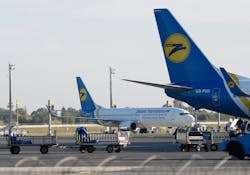Ukraine Implementing Ground Handling Reform
The government of Ukraine is continuing a reform of its national ground handling industry, which began in 2016 and involves the development of its legislative framework and modernization of technical base, operated by local airports and ground handlers, according to recent statements of the Ukrainian government and representatives of some leading Ukrainian ground service providers.
According to a spokesperson of Volodymyr Groysman, Ukraine’s Prime Minister, in the heart of the reform is de-monopolization of the industry and creating conditions for the tightening of competition.
According to Ukrainian government officials and local experts in the field of ground handling, implementation of the reform is an acute need, as the current situation in the Ukrainian ground support industry remains complex, which is mainly due to a lack of competition.
To date, the majority of ground services in Ukraine have been provided by the airports themselves or the companies, affiliated with them. The Ukrainian government has always considered this as a major reason for setting overstated tariffs on ground handling services at domestic airports, as well as frequent cases of discrimination of airlines and other market players by some local monopolies in the field of ground handling.
Groysman’s spokesperson adds another part of the reform will be carried out as part of a recent order, which was recently adopted by the Ukrainian State Aviation Service (Gosaviasluzhba – the Ukrainian state regulator in the field of aviation), under the name of “On Approval of the Aviation Rules of Ukraine. Access to the market for ground handling services at Ukrainian airports.”
According to the press-service of Gosaviasluzhba, the new order contains a set of new requirements for ground handling operations at Ukrainian airports. A spokesman of the press-service of Gosaviasluzhba said these requirements were developed and approved with the purpose of bringing the Ukrainian standards in the field of ground handling with the requirements of the European Aviation Safety Agency and the Council of the EU. The spokesman of the regulator also adds successful implementation of the new standards should help to finally end monopolistic activities of some operators during the provision of ground handling services at Ukrainian airports and to make local ground handling business more transparent.
The new requirements state those ground handling companies cannot be directly connected with an airfield operator, as well as the airline, operating in an airport, the annual volume of which flights from the airport exceed 25 percent of the airline’s annual traffic.
The new order also obliges airports, which independently provide ground handling services, to create a separate division for these activities and to split the accounts.
Irina Kostovskaya, a spokeswoman for the State Aviation Service of Ukraine, says "the developed rules will provide free access to the Ukrainian market of ground handling services for all potential operators.”
She adds the new rules will make the industry’s activities more clear and transparent and will contribute to fair competition in the market.
In the meantime, the new requirements for ground handling have already been criticized by some leading Ukrainian companies. They believe the approved norms do not comply with the Ukrainian realities in the field of aviation and ground handling services and should be seriously adjusted.
From their side, the protesters have even completed their own, alternative set of ground handling standards in Ukraine, with the aim of further consideration from the national government, along with state regulators in the field of aviation.
According to representatives of some leading Ukrainian airports, among which are Boryspil and Zhuliany (the largest airports in Ukraine, both based in Kiev), the new rules will not contribute to the de-monopolization of the Ukrainian market of ground handling services, but just lead to the change of the balance of powers in the industry, that will be within the interests of some affiliated with the state Ukrainian oligarchs.
The protesters insist on the introduction of a special threshold for the accession of new ground handling operators to the airport. According to them, the lack of any restrictions will lead to the fact that smaller players will be withdrawn by larger companies from their bases in airports. That will be mainly due to the opportunity of bigger companies to use the policy of dumping.
According to Oleg Bondar, managing partner of Bondar and Bondar – one of Ukraine’s leading analysts and consulting agencies in the field of ground handling and aviation, there is a need to significantly adjust the newly approved state requirements, so they would be suitable for all companies, operating in the Ukrainian market.
“De-monopolization of the market, as proposed by the state, should be carried out gradually and only in those national airports, which are ready for such innovations,” he says. “For small airports, ground handling operations are currently a significant source of revenue, while its loss may lead to serious financial difficulties of the airport and even its bankruptcy. In addition, this may result in serious losses of air carriers, which use these airports.”
Bondar, together with representatives of some leading Ukrainian airports, said the EU Council Directive 96/67/EC, which became the basis for the development of the new state order and the approved requirements, states that the arrival of a second operator to the airport is economically justified only if it serves more than 2 million passengers a year.
However, currently only Kiev-based Boryspil Airport has such traffic in Ukraine, while passenger and cargo traffic of the majority of other local airports is significantly lower and will not grow to such figures even during the next several years.
Protesters also insist Ukrainian state aviation regulators cannot make any decisions, in regard to ground handling activities at domestic airports, without consultations with an air carrier, which performed more than 50 percent of flights to and from this airport for the last several years.
In the meantime, the Ukrainian government is aware of the current protests of ground handlers and airports, in regard to the ongoing reform and has already promised to consider the alternative set of requirements, designed by operators and to take a decision.
According to Groysman’s office, a final decision would be made no later than July 15.
At the same time, in addition to de-monopolization, the ongoing reform also involves more active adoption of Western standards in the Ukrainian ground handling industry. According to Groysman’s spokesman, the latter is expected to take place through the attraction of some well-known Western experts in this field, as it was in the case of some UK experts in the field of ground handling that were recently invited by representatives of leading Ukrainian airports and airlines.
It is planned, that as part of the reform, the government of Ukraine will allocate about $50 million (USD) for the modernization and further development of IT infrastructure, responsible for ground handling operations at Ukrainian airports. In addition, part of the funds will be provided for the purchases of new ground handling equipment for the needs of the airports.
Overall, in recent years the demand for ground support equipment at Ukrainian airports has significantly increased and currently continues to grow. That became mainly due to the recently approved programs for the modernization of airfield infrastructure, which were approved and implemented by some leading Ukrainian airports.
For example, Kiev’s Boryspil Airport, Ukraine’s largest airport in terms of passenger and cargo traffic, last year invested about $30 million (USD) in the purchase of new airport equipment.
Most of the funds were used for the purchase of six unique multi-purpose snow cutters, specifically designed to serve the runways and taxiways of airports during the winter time. Also, Boryspil became Ukraine’s first airport to purchase the Schmidt ASP 45 machine for the distribution of anti-icing fluid spray with the width up to 45 meters.
Currently the airport’s total fleet of ground service equipment is estimated at more than 3,000 units and is expected to be further expanded by the end of the current year. In addition, part of the funds were also invested in the purchase of newest aircraft tugs, high-loaders, deicers and apron buses.
According to state plans, implementation of the reform should be completed by the second half of 2019.
About the Author

Eugene Gerden
Eugene Gerden is an international freelance writer, who specializes in covering the global aviation and ground handling industries. He has worked for several industry titles and can be reached at [email protected].
